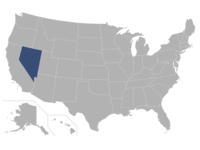Federal legislation would regulate anti-abortion centers

The first crisis pregnancy center (CPC) opened its doors in 1967 in Hawaii, after the state legalized abortion. Now there are at least 2,550 operating in the U.S., including at least seven in Nevada.
The centers, which are usually operated by or affiliated with religious non-profits, have long avoided regulatory requirements that are standard for facilities providing healthcare services, such as providing accurate information, truthful advertising, and protecting the privacy of those seeking help from the centers by making the centers adhere to the Health Insurance Portability and Accountability Act (HIPAA).
The centers also try locate as close to abortion clinics as possible. As one center in Las Vegas boasts on a website page seeking donations, being “footsteps away” from a birth care medical clinic “is a huge strategic advantage” because people seeking abortion services must pass by the anti-abortion center.
Democratic U.S. Sen. Catherine Cortez Masto recently signed on as a co-sponsor of the Stop Anti-Abortion Disinformation (SAD) Act which would authorize the Federal Trade Commission (FTC) to stop deceptive advertising relating to abortion services. A companion bill in the House has 70 co-sponsors, including Nevada Democratic Rep. Dina Titus.
Last year Cortez Masto introduced the DATA Privacy Act, which would protect the information of those seeking abortion and reproductive health care from being shared.
“Anti-abortion crisis care centers routinely mislead vulnerable women about the services they provide, delaying care and jeopardizing women’s health,” Cortez Masto said. “As women continue to seek abortion services in Nevada, it’s crucial that these fake clinics are held accountable.”
CPCs have long disseminated misinformation, including falsely tying abortion to breast cancer, increased mental health issues and the effect of abortion on future fertility.
The centers are well-funded and have the political support of anti-abortion politicians, including in Nevada.
Adam Laxalt, former attorney general and co-chair of the Trump Campaign in Nevada, is running against Cortez-Masto.
“Despite the violent attacks targeting crisis pregnancy centers, Cortez Masto is spending her time spreading lies and demonizing these charities,” Laxalt said on Twitter Friday after Cortez Masto issued a statement supporting the legislation to rein in anti-abortion disinformation. “I’m proud to stand with women who give vulnerable and poor mothers support and the ability to choose life.”
The campaign of Republican candidate for governor Joe Lombardo, who is running against democratic incumbent Gov. Steve Sisolak, paid a crisis pregnancy center in Las Vegas $1,400 for election events earlier this year.
CPCs portray themselves as small scale, local nonprofits, but are often backed by larger organizations worth billions of dollars, according to National Committee for Responsive Philanthropy (NCRP) research.
“That is just another example of how they deceive the public,” said Stephanie Peng, Movements Research Manager for NCRP. “Our research on the IRS tax filings for over a thousand groups engaged in CPC efforts found revenue of more than $4 billion between 2015-2019, more than half of which went to larger religious and charitable organizations that house these programs.”
While Democrats in Congress take up measures to regulate the facilities, some states and cities around the country have all attempted to regulate them, but with limited success.
There are several ways states can start to regulate the clinics, including requiring CPCs to disclose the services they do and don’t provide, repeal laws that mandate doctors give medically inaccurate or biased information including links between abortion and infertility and breast cancer, and passing laws that extend HIPAA-like protections to people who receive services from nonprofits, according to a study by The Alliance: State Advocates for Women’s Rights and Gender Equality.
“Our policy recommendations include mechanisms to hold CPCs accountable for how they treat pregnant people and promote transparency regarding how they spend public money,” said Amal Bass, the Director of Policy & Advocacy at the Women’s Law Project, in the report.
Other recommendations for state-level action include creating a hotline, similar to fraud lines, where people can report if they’re being harassed after going to a CPC, had their personal information sold, were given false information or duped by deceptive advertising on a CPC’s website.
“The scarcity of access to legitimate health care, combined with widespread financial insecurity, is the context that makes people vulnerable to CPCs,” said Bass.
In the wake of the U.S. Supreme Court’s Dobbs v Jackson Women’s Health Organization ruling in June which overturned Roe v. Wade, the lack of state and local regulations on these clinics allows more vulnerable groups to be targeted and misled, according to the NCRP.
The Alliance report also notes that state and local authorities can ensure that any publicly funded organizations like schools or law enforcement point people to reproductive health care clinics and not to CPCs, and state attorneys general must be encouraged to investigate and hold CPCs accountable for using patient-targeting tactics.
While there are Democratic bills in Congress that would regulating the anti-abortion centers, it’s not clear if state-level Democrats in Nevada are similarly motivated.
Asked about regulating the centers, Sisolak’s campaign instead sent a general statement about access to abortion, saying the governor “is committed to expanding access to care and family planning services, codifying his executive order protecting doctors and out-of-state patients from punishment, and making sure abortion remains accessible to all Nevadans.”
Several Nevada legislators, including Democratic state Senate Majority Leader Nicole Cannizzaro, did not respond to requests for comment.








